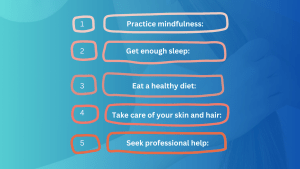Stress is an inevitable part of modern life. It can affect every aspect of our lives, including our skin and hair health. Many studies have shown that stress can have a negative impact on our skin and hair, leading to various conditions like acne, hair loss, and premature aging. As a dermatologist, I have seen the damaging effects of stress on the skin and hair of my patients. In this blog, I will explain the role of stress in skin and hair health and provide tips on how to manage stress for better skin and hair.
How Stress Affects Skin and Hair
When we experience stress, our body releases cortisol, a hormone that can trigger a range of physiological responses, including inflammation. Inflammation can damage the skin’s barrier function, leading to dryness, redness, and acne. Moreover, cortisol can stimulate the sebaceous glands, leading to an overproduction of oil, which can clog pores and cause acne.
Stress can also have a negative impact on the hair. Chronic stress can lead to hair loss or thinning hair, a condition called telogen effluvium. Stress can also affect the quality of our hair, making it dull, dry, and prone to breakage.
How to Manage Stress for Better Skin and Hair
Managing stress is crucial for maintaining healthy skin and hair. Here are some tips on how to manage stress for better skin and hair:

Exercise regularly: Exercise can help reduce stress and improve blood flow to the skin and hair follicles, promoting healthy skin and hair growth.
Practice mindfulness: Mindfulness practices like meditation and deep breathing can help reduce stress and promote relaxation.
Get enough sleep: Lack of sleep can increase stress levels and lead to a range of skin and hair problems. Aim to get 7-8 hours of sleep per night to promote healthy skin and hair.
Eat a healthy diet: A diet rich in fruits, vegetables, and healthy fats can help reduce inflammation and promote healthy skin and hair.
Take care of your skin and hair: Good skincare and hair care practices can help maintain healthy skin and hair, even during times of stress. Use gentle, non-irritating skincare products, and avoid over-styling or using harsh chemicals on your hair.
Seek professional help: If stress is causing severe skin or hair problems, seek professional help from a dermatologist or a therapist. They can provide effective treatments to help manage stress-related skin and hair problems.
In addition to the tips mentioned above, there are several other ways to manage stress for better skin and hair health. For example, getting regular massages or acupuncture treatments can help reduce stress and improve blood flow to the skin and hair follicles. These treatments can also help promote relaxation and improve sleep quality, both of which are important for healthy skin and hair.
Another effective stress management strategy is to practice yoga or other forms of exercise that incorporate mindfulness and relaxation techniques. Yoga can help reduce stress, improve flexibility, and increase blood flow to the skin and hair follicles. Additionally, yoga can help regulate hormone levels, which can help reduce the negative effects of stress on the skin and hair.
If you are experiencing stress-related skin or hair problems, it’s important to seek professional help from a dermatologist or a therapist. They can provide effective treatments to help manage stress-related skin and hair problems, such as topical creams or medications for acne, or hair restoration treatments for hair loss.
It’s also important to remember that managing stress is not a one-time event, but an ongoing process. By incorporating stress-reducing activities and healthy lifestyle practices into your daily routine, you can promote healthy skin and hair, reduce the negative effects of stress, and improve your overall quality of life.
In conclusion, stress can have a significant impact on our skin and hair health, but with the right strategies, we can manage stress and maintain healthy skin and hair. By incorporating healthy lifestyle practices, seeking professional help when necessary, and practicing stress-reducing activities like yoga and meditation, we can keep our skin and hair looking and feeling their best, even during stressful times.

